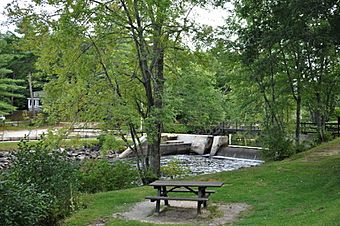Songo Lock facts for kids
|
Songo Lock
|
|
|
U.S. Historic district
Contributing property |
|
 |
|
| Location | Songo River, Sebago Lake State Park, Naples, Maine |
|---|---|
| Area | 1.8 acres (0.73 ha) |
| Built | 1830 |
| Part of | Cumberland and Oxford Canal (ID74000317) |
| NRHP reference No. | 70000093 |
Quick facts for kids Significant dates |
|
| Added to NRHP | February 16, 1970 |
| Designated CP | November 1, 1974 |
The Songo Lock is a special water gate that helps boats move between different water levels. It is the only one left from the old Cumberland and Oxford Canal. This canal was built in the 1800s in southern Maine, United States.
You can find the Songo Lock on the Songo River. It is near where the Songo River meets the Crooked River. This spot is at the northern end of Sebago Lake State Park in Naples. The lock was built in 1830. Today, it is mostly used by fun boats during the summer. It was added to the National Register of Historic Places in 1970 because it is an important historical site.
Contents
About Songo Lock and Its History
The Cumberland and Oxford Canal was a big idea from the early 1800s. People wanted a way to move things like wood and other goods. They needed to get them from the harbor in Portland, Maine to towns further inland. These towns included Bridgton and Harrison on Long Lake.
Building the Canal
The canal was finished in 1830. This was the same year the Songo Lock was completed. The canal worked as a way to transport goods for businesses until 1870. The Songo Lock was one of 28 locks built for the canal. It was a very important spot for boats. It helped them travel between Sebago Lake and Brandy Pond. Brandy Pond is the southern part of Long Lake.
Changes Over Time
In 1911, the Songo Lock was made bigger and more modern. This work was done by the Sebago Lake Improvement Company. They were making the area a popular place for summer vacations. Now, the state of Maine takes care of the lock. It is part of Sebago Lake State Park.
How the Lock Was Built
When the Songo Lock was first built in 1830, it was 90 feet (27 meters) long. It was also 26 feet (7.9 meters) wide. It was built next to a man-made island made of rough stones. This island helped to move the river's slow water around the building site. The sides of the lock were made of strong granite. Its first control gates were made of wood.
When the lock was rebuilt in 1911, it became even larger. It was made 110 feet (34 meters) long and 28 feet (8.5 meters) wide. New iron gates were added. The walls were also covered with concrete to make them stronger.
 | Roy Wilkins |
 | John Lewis |
 | Linda Carol Brown |



